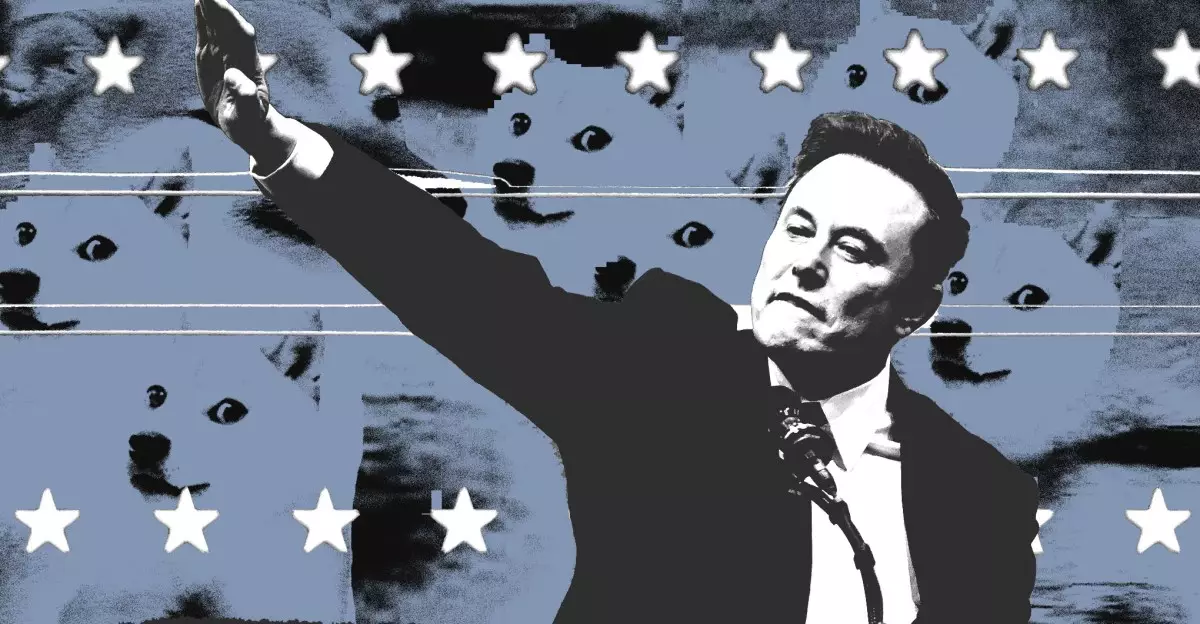In an era where the political landscape appears more polarized than ever, the recent resignation of Marko Elez, a 25-year-old staffer for the Department of Government Efficiency (DOGE), has thrown open the windows into a dark and troubling corner of American politics. Elez’s social media activity, which revealed a disturbing penchant for promoting eugenics and racist ideologies, has raised alarm bells about the infiltration of far-right ideologies into governmental positions once thought to be devoid of such extremism. The implications of his beliefs—along with the environment that fostered them—extend far beyond his individual case and into the fabric of contemporary political ethics.
Elez’s social media presence was not merely anecdotal but rather a stark reflection of a growing movement among certain segments of youth within the conservative sphere. His now-deleted account contained inflammatory rhetoric, including calls for the repeal of the Civil Rights Act and the implementation of a “eugenic immigration policy.” These posts not only manifest his personal beliefs but also demonstrate a troubling alignment with ideologies that are increasingly surfacing in right-wing discourse. The proclamation that “99% of Indian H1Bs will be replaced by slightly smarter LLMs” fits neatly within a broader narrative that undermines the contributions of immigrants in favor of promoting a narrow, racially-defined understanding of competence and merit.
Elez’s resignation followed scrutiny from the Wall Street Journal, serving as a grim reminder of the striking contrasts between the public’s expectations of government officials and the actions of those who might pursue agendas rooted in racial exclusion. This incident begs the question: How many more individuals within public office harbor similar beliefs, and how do their personal convictions influence policy decisions that affect millions?
The Department of Government Efficiency, as spearheaded by notable figures like Elon Musk, has proclaimed a mission of reducing bureaucratic inefficiencies. However, as evidenced by cases like Elez’s, this mission is riddled with underlying agendas aimed at dismantling diversity, equity, and inclusion (DEI) initiatives that have become institutional fixtures across various government level. Programmatic funding has been slashed under the guise of efficiency while simultaneously promoting a narrative that champions a “meritocracy” which many argue is, in practice, exclusionary.
Musk’s DOGE has faced accusations of actively rooting out DEI programs, claiming adherence to a “woke” agenda is detrimental to effective governance. Ironically, this new order aims to install a semblance of a homogenous leadership style that not only discounts diversity but paints inclusive policies as obstacles to government effectiveness. It leads to a paradox that questions the very definition of competence.
Elez’s case is not isolated; it mirrors wider trends of normalization of extremist rhetoric within conservative circles. The hiring of Darren Beattie by the State Department underscores this alarming trajectory. Despite being previously ousted due to his links with white nationalists, Beattie has found a second chance in an administration open to rhetoric that promotes the supremacy of “competent white men” over inclusive governance.
This disturbing turn is indicative of a faction within the Republican ecosystem that is fervently growing—we could call it the “groyperfication,” a term used to describe the emergence of a youthful cadre of conservatives increasingly aligned with the radical tenets of the far right. Indeed, the institutional embrace of such ideologies puts the very foundations of American values and the purpose of civil rights legislation into disarray.
As the political climate becomes increasingly embroiled in ideological contests, one cannot downplay the seriousness of the Elez resignation and its implications. It serves as a glaring warning of the potential erosion of ethical standards within public service roles. Moreover, this incident should energize public discourse surrounding accountability in government settings, especially in a time when the dogma of intolerance threatens to eclipse the rights that were hard-won over generations. Society must remain vigilant, insisting upon inclusivity, and relentlessly advocating for ethical governance free from the ghosts of eugenics and racism. As we navigate this unsettling terrain, a commitment to the principles of equity and justice must remain unwavering, serving as an ever-present counterbalance to the rising tide of extremist rhetoric.

